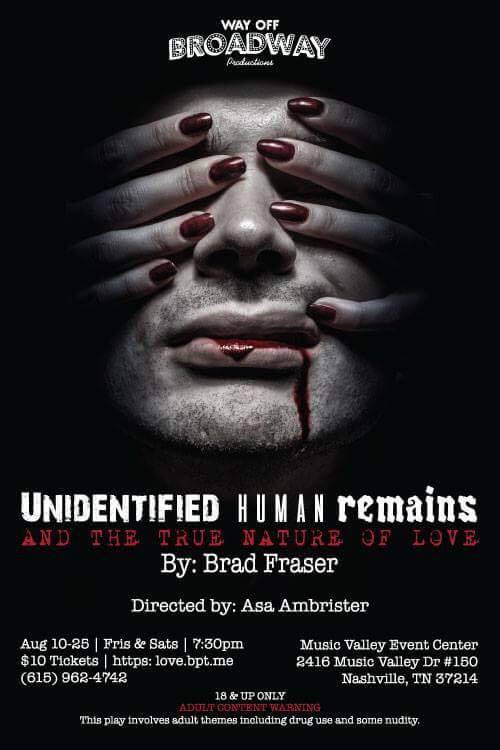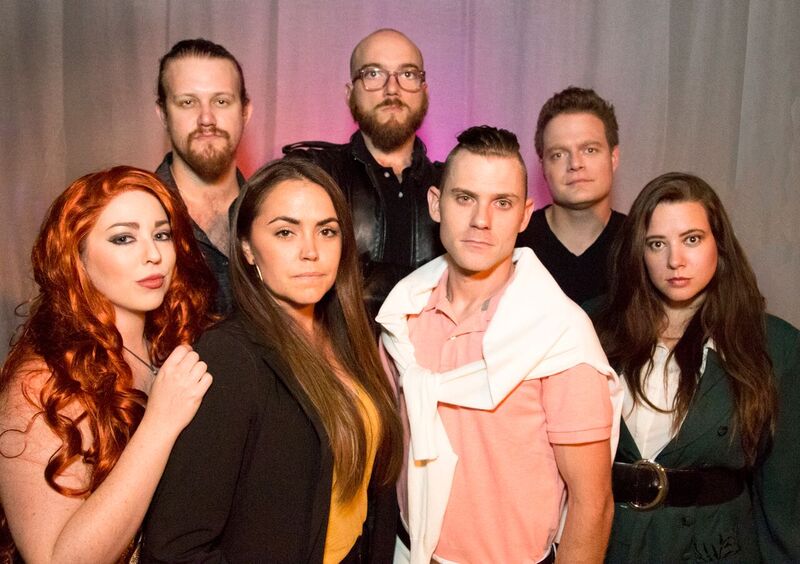Review: Way Off Broadway Productions' Chilling and Stunning UNIDENTIFIED HUMAN REMAINS...
 On first consideration, Brad Fraser's 1989 play Unidentified Human Remains and the True Nature of Love is a darkly comical look at a group of disaffected young Canadians hurtling toward their 30s with no real sense of purpose or identity guiding them on their way. But if you look more closely - even a desultory glance at the script - it's easy to see that the playwright has more to motivate him in capturing a very particular time and place in his characters' lives.
On first consideration, Brad Fraser's 1989 play Unidentified Human Remains and the True Nature of Love is a darkly comical look at a group of disaffected young Canadians hurtling toward their 30s with no real sense of purpose or identity guiding them on their way. But if you look more closely - even a desultory glance at the script - it's easy to see that the playwright has more to motivate him in capturing a very particular time and place in his characters' lives.
The search for love, purpose and a sense of identity set against the backdrop of news reports of a serial killer run amok would seem fanciful and otherworldly were it not for the realities of the world in which we live: When I was in my early 30s, for example (at the same time Fraser penned his best-known play), I was writing about a series of murders of gay men in Nashville, something that seemed far-fetched and fictional, and I was ultimately approached by the convicted killer with an offer to write a book about him (but to gain that access to him, he wanted me to help him sell his soiled underwear to gay men interested in acquiring the smelly undergarments of a street hustler turned murderer - but that's another story for another day). So while my own life's experience may make me the target audience for Fraser's play, the impact of his fictional work has further-reaching implications that make it good theater.
Now onstage at Music Valley Event Center through August 26, in an engaging, perhaps even mesmerizing, production from Way Off Broadway Productions under the direction of Asa Ambrister, Fraser's play comes to life not only as a cautionary tale of the dangers of indiscriminate sex and malaise brought about by that general sense of disaffectedness, which only adds to the palpable feeling that you may have actually been there (wherever "there" may mean to you, the average audience member) before. Ambrister's briskly paced and beautifully acted treatment of Unidentified Human Remains... results in a far more chilling theatrical experience than anticipated when you stepped up to the box office and plopped your money down for a ticket.
Part of Way Off Broadway Productions' initiative to present theater not often seen in these parts - in fact, the last Nashville production of Unidentified Human Remains and the True Nature of Love dates back at least a quarter of a century (to the early to mid-1990s) in an award-winning and critically acclaimed production that played Darkhorse Theater, directed by First Night Award winner Aileen Loy, and starring Harrison Williams, Carol Clark, Heather Corwin, Melissa Burnett and Brian Baytosh, among others - this latest iteration bodes well for the newish theater company, as well as for audiences eagerly anticipating what's to follow in the coming seasons (that upcoming production of Rent notwithstanding).
Set in 1989 in Edmonton, Alberta, Canada, Fraser's sharply written script focuses on a disparate group of friends brought together - to startling effect - by happenstance and the mysteries of modern life. To his credit, Ambrister very intelligently grounds his rendition of Unidentified Human Remains... with a sense of the period in which the play is set, ensuring that audiences can view the shocking events portrayed in the play from the perspective of a time-hopping interloper. Audiences can, therefore, witness the oftentimes horrific, yet somehow amusing and highly entertaining, interactions of the characters from a voyeuristic perspective that is somehow desensitizing, which makes the sex, blood and gore (or the suggestion thereof) more palatable.
Fraser's protagonists in the play are two platonic roommates: David, about to turn 30, is gay, the former star of a defunct TV series who now waits table at a trendy Edmonton eatery, and Candy, his presumably heterosexual gal pal who reviews books she intensely dislikes, while avoiding human connection and dealing with an eating disorder. In their way, David and Candy are archetypes of the late 20th Century (not unlike Ross, Rachel, Chandler, Monica and the rest of their Friends), complete with buzzworthy attributes that seem to define the era almost as certainly as blue jeans and bobby sox typify the 1950s or war bonds and the Andrews Sisters have come to represent the World War II era. Ambrister's clever use of a musical soundtrack from the late 1980s (kudos to Seth Limbaugh for his sound design) instantly transports his audiences to the era, even more easily than Fraser's razor-sharp dialogue does.

Smith, Evan Grabenstein, Bradle Moore and Cat Glidwell
David and Candy rib each other mercilessly and set the tone for what is to come in the darkly funny play, as we are introduced to the other people in their social orbit, including Benita, a clairvoyant prostitute; Bernie, David's best friend from boyhood who now works in a dead-end job with the city; Jerri, a recent transplant to Edmonton who falls hard for Candy; Kane, a 17-year-old busboy who's weirdly fascinated with the former sitcom star; and Robert, the bar man at a local watering hole where Candy stops in daily for a soda water with double lime.
The seven characters are brought together organically, in ways that are completely universal whether you have actually ever conversed with a serial killer, dealt with the advances of a lovesick suitor or shared a meal with a municipal employee in your own life. In that way, Fraser ably mirrors reality, while heightening the situations to a more theatrical plane that surely intrigues and engages John Q. and Sally Q. Public sitting out in the dark.
While Ambrister delivers a noteworthy production that evokes the time and place with an easy grace, perhaps more to his credit he has assembled an ensemble of actors who become the fictional characters with a fierceness that is at one impressively authentic and wonderfully larger than life.
Bradley Moore is terrific as the acerbic, often sarcastic and all-too-real David, who gradually accepts the truth of his own personal situation as he realizes the truth about the people with whom he surrounds himself. Moore's naturalistic performance allows David's personality to shine, which is a blend of accessible charm and a certain off-putting gruffness that keeps the audience - as well as the other characters - at arms-length.
As Candy, Catherine Glidwell gives a somewhat soul-baring, and unflinchingly bitchy, performance, that ensures her character's redemption when she ultimately reveals all the moving parts inside that have rendered her as such. Glidwell's earlier fiery interactions with the other actors make for an action-packed denouement that unfolds in the play's later scenes.
Cast as David's difficult and diffident best friend Bernie, MacKenzie Smith once again puts his tremendous talents on display - why don't we see this actor cast in productions by some of Nashville's larger, paying theatrical concerns? - and in the process creates a multi-layered characterization that rivents your attention to him the moment he walks onstage, even if it's to utter a single word or phrase in one of the many scenes in which the playwright uses plenty of theatrical magic to create a sense of unease and indifference.
As Jerri, the lovelorn lesbian who falls for Candy during aerobics classes at the neighborhood gym, Casey Roberts lays bare her intentions in a performance that crackles with intense honesty, and Alex White (cast as Robert, Candy's other paramour from the bar) walks a fine line between boorish and appealing, leading to an unveiling of his true nature that is unsettling. Evan Grabenstein plays the equally confused (and confusing, truth be told) Kane with gleeful abandon, embodying the teenager's dual natures (Is he or isn't he? Will he or won't he?) with confidence.
But it's Paige Songer as the prostitute/psychic Benita who virtually steals the show with her no-holds-barred performance that is stunning, yet heartbreaking. Songer's unfettered and completely genuine performance is captivating and she plays her character with studied deference and surprising wit: Benita is the most compelling character among Fraser's creations. Songer plays Benita for all she is worth. You are likely to leave the theater with her performance dominating your thoughts about Unidentified Human Remains... in hopes of seeing her onstage again. And very soon.
Also noteworthy about Songer: The actor looks great in a variety of wigs - after months of seeing a whole lot of bad wigs onstage in the Nashville/Middle Tennessee area, Songer is absolutely beautiful in a succession of hairpieces, that come a wide range of colors.
Unidentified Human Remains and the True Nature of Love. By Brad Fraser. Directed by Asa Ambrister. Produced by Freddrick Upp. Presented by Way Off Broadway Productions, at Music Valley Event Center, Nashville. Through August 26. Running time: 2 hours, 15 minutes (with one 15-minute intermission).
photo by Kellie Leming
Reader Reviews
Videos

